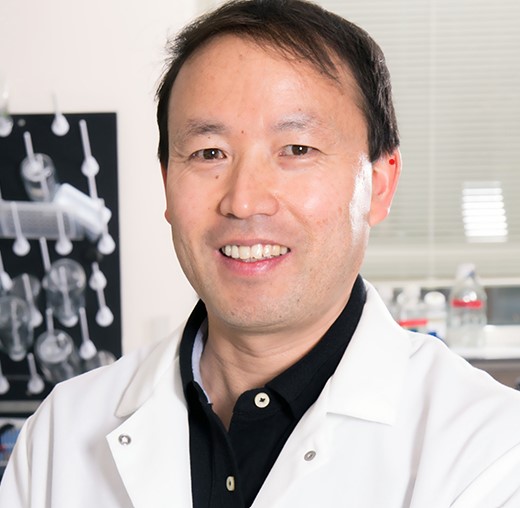
Free radical toxicology; environmental cardiovascular inflammation and injury; redox signaling; amelioration of vascular dysfunction and toxicity with bioactive compounds.
Ph.D., Virginia Polytechnic Insitute and State University (Virginia Tech)
Research in my laboratory is focused on investigating environmental chemical-induced vascular inflammation and injury with a special interest on understanding the possible signaling mechanisms involved. The environmental chemicals of interest include the anthracycline quinone (known as doxorubicin), polycyclic aromatic hydrocarbon (PAH)-derived- quinones, acrolein, and nanoparticles. In line with this research, funded by the NIH, we are also actively investigating the molecular mechanism(s) of action of novel bioactive compounds that target and reduce toxicant-mediated cardiovascular inflammation. Our approaches include cell- and molecular biology techniques, and physiologically relevant animal models.
Khan, A., and Jia, Z. (2023). Recent insights into uptake, toxicity, and molecular targets of microplastics and nanoplastics relevant to human health impacts. iScience 26, 106061. 10.1016/j.isci.2023.106061.
Ahmed, H., Amin, U., Sun, X., Pitts, D.R., Li, Y., Zhu, H., and Jia, Z. (2022). Triterpenoid CDDO-IM protects against lipopolysaccharide-induced inflammatory response and cytotoxicity in macrophages: the involvement of the NF-κB signaling pathway. Experimental biology and medicine (Maywood, N.J.) 247, 683-690. 10.1177/15353702211066912.
Khan, S., Chavez, J., Zhu, X., Chiu, N.H.L., Zhang, W., Yin, Z., Han, J., Yang, J., Sigler, R., Tian, S., Zhu, H; Li, Y; Wei, J; Yi, X, Jia, Z. (2021). Carbon Nanodots Inhibit Oxidized Low Density Lipoprotein-Induced Injury and Monocyte Adhesion to Endothelial Cells Through Scavenging Reactive Oxygen Species. J Biomed Nanotechnol 17, 1654-1667. 10.1166/jbn.2021.3125.
Fowler, J., Tsui, M.T., Chavez, J., Khan, S., Ahmed, H., Smith, L., and Jia, Z. (2021). Methyl mercury triggers endothelial leukocyte adhesion and increases expression of cell adhesion molecules and chemokines. Experimental biology and medicine (Maywood, N.J.) 246, 2522-2532. 10.1177/15353702211033812.
Dunphy, A.; Patel, K.; Belperain, S.; Pennington, A.; Chiu, N.H.; Yin, Z.; Zhu, X.; Priebe, B.; Tian, S.; Wei, J.; Yi, X, Jia, Z (2021). Modulation of macrophage polarization by carbon nanodots and elucidation of carbon nanodot uptake routes in macrophages. Nanomaterials 2021, 11, 1116:1-16.
Khan, S., A. Dunphy, M. S. Anike, S. Belperain, K. Patel, N. H. L. Chiu and Jia Z (2021). Recent Advances in Carbon Nanodots: A Promising Nanomaterial for Biomedical Applications. Int J Mol Sci 22(13): 1-31.
Tian, S., Nakamura, J., Hiller, S., Simington, S., Holley, D.W., Mota, R., Willis, M.S., Bultman, S.J., Luft, J.C., DeSimone, J. M. DeSimone, Jia Z, N. Maeda and X. Yi (2020). New insights into immunomodulation via overexpressing lipoic acid synthase as a therapeutic potential to reduce atherosclerosis. Vascular pharmacology 133-134, 106777. 10.1016/j.vph.2020.106777.
Shukla, H., R. Chitrakar, H. A. Bibi, G. Gaje, A. Koucheki, M. A. Trush, H. Zhu, Y. R. Li and Jia, Z (2020). “Reactive oxygen species production by BP-1,6-quinone and its effects on the endothelial dysfunction: involvement of the mitochondria.” Toxicol Lett 322: 120-130.
Liu, S., M. T. Tsui, E. Lee, J. Fowler and Jia, Z (2020). “Uptake, efflux, and toxicity of inorganic and methyl mercury in the endothelial cells (EA.hy926).” Sci Rep 10(1): 9023.
Shukla, H., G. Gaje, A. Koucheki, H. Y. Lee, X. Sun, M. A. Trush, H. Zhu, Y. R. Li and Jia, Z (2020). “NADPH-quinone oxidoreductase-1 mediates Benzo-[a]-pyrene-1,6-quinone-induced cytotoxicity and reactive oxygen species production in human EA.hy926 endothelial cells.” Toxicol Appl Pharmacol 404: 115180.
Ji, Z., Z. Yin, Jia, Z and J. Wei (2020). “Carbon Nanodots Derived from Urea and Citric Acid in Living Cells: Cellular Uptake and Antioxidation Effect.” Langmuir 36(29): 8632-8640.
Complete list of publications in google scholar
Environmental Health Science II (Bio-632)
Current Research in Environmental Health Science (BIO-634)
Molecular Toxicology (Bio-635)
Essentials of Toxicology (BIO-488)
Current Topics in Biology (BIO 449)
Toxicological Research Laboratory (BIO 597)
Molecular Approaches to Research (Bio-482)